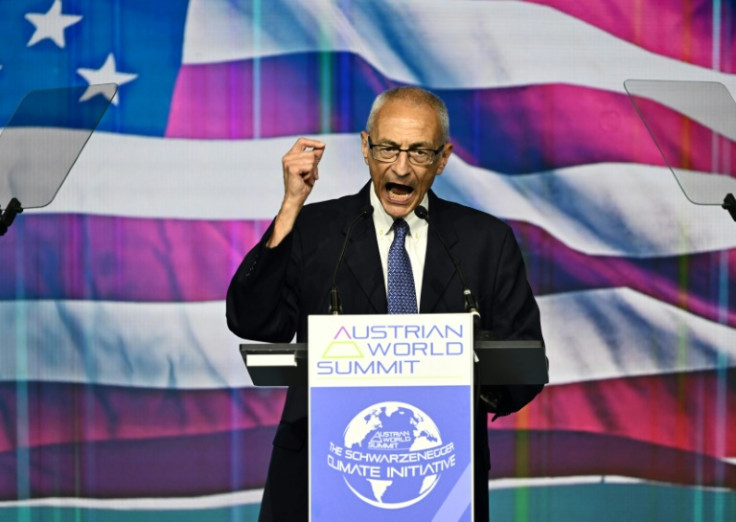US Climate Envoy John Podesta To Visit China This Week

US climate envoy John Podesta will visit China this week for talks with counterpart Liu Zhenmin, state media said Tuesday, ahead of the COP29 summit in Baku in November.
The two officials will "have an in-depth exchange of views on practical cooperation", state broadcaster CCTV said.
They will also discuss "their respective domestic climate policy actions and the multilateral process on climate change", CCTV said.
Envoys Liu and Podesta met for the first time in their roles in Washington in May, promising to work together on reducing methane, the second-most abundant greenhouse gas.
In the two days of talks, the pair looked for ways of "promoting a successful COP29 in Baku, Azerbaijan", the US State Department said.
President Joe Biden's administration has seen climate as an area for cooperation with China despite wide differences and tensions.
Previous climate envoy John Kerry, a former secretary of state, developed a friendship with Xie Zhenhua, the veteran Chinese climate negotiator, with the two holding extended, secluded talks in California ahead of last year's COP28 in Dubai.
Their unusually close relationship helped bring consensus at that summit.
Before the Dubai meeting, China promised a broad plan to tackle methane, of which it is the world's largest emitter -- an especially touchy political issue as methane comes mostly from its coal mining.
And the two countries in May said they would co-host an event in Baku, the second of its sort, on reducing methane and other non-carbon greenhouse gases.
"The two sides committed to promote bilateral cooperation and conduct capacity building on deploying abatement technologies," the statement said.
They also agreed to improve monitoring and standards "aiming to achieve significant methane emissions control and reductions in the 2020s".
China has stopped short of signing a global pledge led by the United States and the European Union to reduce global methane emissions by at least 30 percent from 2020 levels by 2030.
Methane is far more potent than carbon dioxide, the most prevalent greenhouse gas, but it spends a briefer time in the atmosphere -- years rather than centuries.
Methane is emitted from the production of oil and natural gas as well as agriculture.
Successive UN climate summits have set a goal of stopping Earth from heating up more than 1.5 degrees Celsius (2.7 Fahrenheit) beyond pre-industrial levels to avoid the worst ravages of climate change, but the planet remains well off track.
The Dubai talks for the first time agreed that the world needs to transition away from fossil fuels.
China is the world's biggest emitter of the greenhouse gases driving climate change, such as carbon dioxide.
© Copyright AFP 2025. All rights reserved.





















